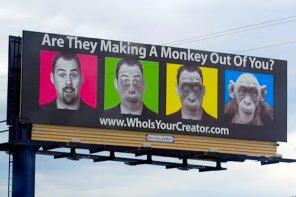The April 18 release of Ben Stein’s film Expelled: No Intelligence Allowed will no doubt unleash into the blogosphere and airwaves of America more of the same, us vs. them, “raving evangelicals” vs. “atheist scientists” brouhaha. Everyone from Time to Scientific American to the Discovery Institute has already weighed in. Much of it misses the point.
In the ninety minute documentary, Stein frames the creation/evolution discussion as a First Amendment Issue: look at all these scientists who were ostracized by the scientific community because they claim Intelligent Design may have some truth to it. Just the making of this documentary has come complete with charges of misrepresentation, with some scientists interviewed for the film saying they were not told what it would be about and that it would have a different, less provocative title.
In much of what is written scientists will be aligned with atheism; intelligent design supporters with ignorance. There will even be some even-handed discussion about how even if Stein might be making some good points, he is using faulty data, unreasonable arguments, inappropriate visual images and music, etc. to manipulate the viewer.
Framing the battle as one of “rights” is important, perhaps, but mostly as a symptom of a much greater disease: how ineffectively we teach evolution and science in general in this country. We scientists should not be so surprised how many Americans are swayed by the “scientist=atheist” rhetoric so impressively deployed in Expelled and other media; Americans have trouble conceptualizing evolution without a designer, how many Americans just plain distrust science. Just look at how science is taught and experienced by the typical American: As though science is a collection of facts that exist in a moral vacuum independent of humans; science is something you memorize; science is mathematics and data; we don’t have time to do science today, which was just an experiment the results of which we already knew anyway.
These periodic bursts of public outpourings around science in Dover or Kansas or in movie theaters this weekend should be looked at by scientists and educators not with smugness and I-told-you-so attitudes. Not as battles we win or lose. But as wake-up calls.
We scientists need to teach and do science better, to engage the public and students more effectively. We need to engage and maintain the glee and energy around science I see regularly in elementary school kids, to show that evolution, for example, is both powerful and the best scientific explanation for change and diversity, but it’s not the only explanation; we must demonstrate the wonders and limitations of science.
America is a religious country and an increasingly scientifically illiterate one. Fewer and fewer Americans become scientists. Let’s wake up and engage human-ness in the science classroom. Enough hiding behind weak statements like “I don’t discuss anything that’s not science in my classroom”; “I’ve already got too much to cover”; or “I’m not trained to engage these issues” (shoot, my colleagues at universities get no formal training in how to teach anything, but that doesn’t stop us). It’s time to wake up. It’s a teachable moment.




